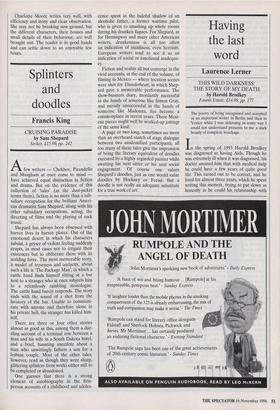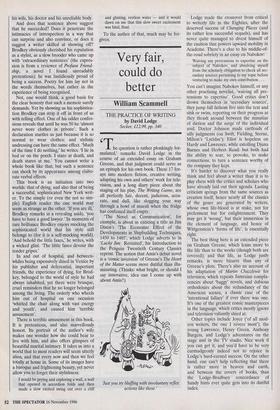Having the last word
Laurence Lerner
THIS WILD DARKNESS: THE STORY OF MY DEATH by Harold Brodkey Fourth Estate, £14.99, pp. 177
The poetry of being recognised and accepted as an important writer in Berlin and then in Venice while I was sickening in some way I could not understand presents to me a dark beauty of complete wreckage.
In the spring of 1993 Harold Brodkey was diagnosed as having Aids. Though he was extremely ill when it was diagnosed, his doctor assured him that with medical help he could have a few years of quite good life. This turned out to be correct, and he lived for almost three years, which he spent writing this memoir, trying to put down as honestly as he could his relationship with his wife, his doctor and his unreliable body.
And does that sentence above suggest that he succeeded? Does it penetrate the intimacies of introspection in a way that can surprise and also convince, or does it suggest a writer skilled at showing off? Brodkey obviously cherished his reputation as a stylist, as a slow brooder who came up with 'extraordinary sentences' (the expres- sion is from a reviewer of Profane Friend- ship, a novel I found unreadably pretentious); he was fastidiously proud of being a success. Poetry for him lay not in the words themselves, but rather in the experience of being recognised.
Not, one would think, a good basis for the clear honesty that such a memoir surely demands. Yet by showing us his sophistica- tion Brodkey can strip it off in front of us with telling effect. One of his odder confes- sions reveals that until he was 50 he 'almost never wore clothes in private'. Such a declaration startles us just because it is so normal to wear clothes; and stylistic undressing can have the same effect. 'Much of the time I do nothing,' he writes. 'I lie in bed or on the porch. I stare at death, and death stares at me.' You cannot write a whole book like that, but such a sentence can shock by its appearance among elabo- rate verbal effects.
This book is an initiation into two worlds: that of dying, and also that of being a successful, sophisticated New York writ- er. To the simple (or even the not so sim- ple) English reader the one world may seem as strange as the other. 'If you are Brodkey remarks in a revealing aside, 'you have to have a good lawyer.' In moments of rare brilliance Brodkey enjoys mocking the sophisticated world that his style still belongs to (for it is a self-mocking world). `And behold the little faxes,' he writes, with a wicked glint. 'The little faxes devour the tender gripes.'
In and out of hospital, and between- whiles being expensively dined in Venice by his publisher and deferential, important friends, the experience of dying, for Brod- key, belonged to the world of style he had always inhabited, yet there were brusque, cruel reminders that he no longer belonged among the living. The orderly who wheels him out of hospital on one occasion `whirled the chair along with vast energy and youth', and caused him 'terrible amusement'.
There is terrible amusement in this book. It is pretentious, and also marvellously honest. Its portrait of the author's wife makes one wonder how she could bear to live with him, and also offers glimpses of beautiful marital intimacy. It takes us into a world that to most readers will seem utterly alien, and that every now and then we feel totally at home in. Some of its images have a baroque and frightening beauty, yet never allow you to forget their stylishness: I would be prying and exploring a wall, a wall that opened in accordion folds and then made a slow excited swing out over a cliff
and glinting, restless water — and it would dawn on me that this slow sweet excitement was fatal, final.



















































































 Previous page
Previous page